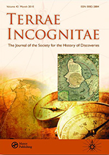
Terrae Incognitae-The Journal of the Society for the History of Discoveries
Scope & Guideline
Charting the Course of Historical Exploration
Introduction
Aims and Scopes
- Exploration and Discovery History:
This area encompasses the examination of historical voyages and expeditions, analyzing the motivations, experiences, and impacts of explorers from various cultures and periods. - Cartography and Geographical Knowledge:
The journal focuses extensively on the evolution of maps and cartographic practices, exploring how these tools shaped perceptions of the world and influenced colonial and imperial ambitions. - Cultural Interactions and Representations:
It investigates the interactions between different cultures during periods of exploration, particularly how these encounters were documented and represented in literature, art, and scientific discourse. - Impact of Disease and Epidemics:
A significant focus is placed on the role of diseases and epidemics in shaping exploration narratives and their consequences for indigenous populations and colonial societies. - Environmental and Climate Studies:
The journal examines the relationship between exploration, environmental change, and climate, highlighting how geographical knowledge has been influenced by and has influenced ecological conditions.
Trending and Emerging
- Interdisciplinary Approaches:
Recent publications are increasingly interdisciplinary, combining history with fields such as environmental science, sociology, and cultural studies, reflecting a broader understanding of exploration's complexities. - Indigenous Agency and Perspectives:
There is a growing emphasis on indigenous narratives and the agency of indigenous peoples in historical accounts of exploration, challenging traditional narratives that often marginalize these voices. - Impact of Disease on Exploration:
The exploration of how diseases influenced exploration history, including the effects of pandemics on indigenous populations and explorers alike, has gained traction, particularly in light of recent global health crises. - Cultural Representations in Exploration Narratives:
Emerging themes focus on how exploration narratives have been constructed and the cultural implications of these representations, particularly in literature and visual media. - Climate Change and Exploration History:
There is an increasing trend towards examining the historical relationship between exploration and climate change, considering how environmental factors shaped exploration routes and experiences.
Declining or Waning
- Traditional Imperial Narratives:
Papers focusing solely on glorified accounts of imperial conquests and exploration without critical analysis have become less frequent, indicating a shift towards more nuanced discussions of colonial impacts. - Eurocentric Perspectives:
There is a noticeable decline in works that solely adopt Eurocentric viewpoints on exploration, as the journal increasingly emphasizes diverse narratives and indigenous perspectives. - Technological Advances in Navigation:
Research that primarily discusses the technological advancements in navigation tools without connecting them to broader historical contexts or cultural implications is receiving less attention. - Historical Accounts of Maritime Exploration:
While maritime exploration remains a topic of interest, there is a reduced frequency of papers focused solely on the technical aspects of maritime expeditions, suggesting a move towards interdisciplinary approaches that incorporate social and environmental factors.
Similar Journals

Asian Review of World Histories
Bridging Disciplines: Where Asian Histories Meet Global NarrativesAsian Review of World Histories, published by BRILL, stands as a pivotal scholarly journal dedicated to the multidisciplinary exploration of historical narratives across Asia and their global interplay. With an ISSN of 2287-965X and E-ISSN 2287-9811, the journal has established itself as a significant platform in the fields of History, Cultural Studies, and Sociology and Political Science, categorized among Q2 and Q3 journals as of 2023. With its reach encapsulating converged years from 2013 to 2024, the journal aims to foster interdisciplinary dialogue while advancing the understanding of Asian histories' influence on current global dynamics. Though not listed as open access, the journal's valuable contributions in the Scopus rankings—with notable standings in Arts and Humanities and Social Sciences—underscore its importance for researchers, professionals, and students seeking to deepen their engagement with the complexities of world histories. Situated in Leiden, Netherlands, this journal invites submissions that offer fresh insights and comprehensive analysis, promoting an enriched understanding of historical discourses within and beyond Asian contexts.

International Journal for History, Culture and Modernity
Exploring the Nexus of Past and PresentThe International Journal for History, Culture and Modernity, published by BRILL, stands as a pivotal platform for scholars and practitioners in the fields of history and cultural studies. With an ISSN of 2666-6529 and an E-ISSN of 2213-0624, this journal has been contributing to academic discourse since its inception in 2015. Focusing on contemporary historical analysis, cultural narratives, and modernity, it aims to unravel the intricacies of past and present, thereby fostering a nuanced understanding of societal evolution. Indexed in Scopus with notable rankings—Q2 in History and Q3 in Arts and Humanities (miscellaneous)—it appeals profoundly to researchers and students alike. The journal's commitment to open access ensures that its scholarly contributions remain widely available, making it an essential resource for those dedicated to advancing knowledge in the humanities. Situated in Leiden, Netherlands, at PLANTIJNSTRAAT 2, P O BOX 9000, it embodies a tradition of academic excellence that is integral for contemporary scholarship.

Navigator-Subsidios para a Historia Maritima do Brasil
Exploring Brazil's Maritime LegacyNavigating maritime history in Brazil, the journal Navigador-Subsidios para a Historia Maritima do Brasil serves as a pivotal platform for scholars, researchers, and enthusiasts alike. Published by the Ministerio Marinha, Serv Documentacao Geral Marinha, this esteemed journal has been offering Open Access content since 2005, ensuring that valuable insights into Brazil's rich maritime heritage are accessible to a global audience. Featuring a wide range of scholarly articles, the journal addresses various aspects of maritime history, including naval exploration, trade routes, and the cultural impact of seafaring on Brazilian society. By continually contributing to academic discourse, Navigador plays an essential role in preserving and promoting Brazilian maritime heritage, appealing to professionals in history, maritime studies, and cultural research.
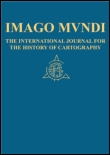
Imago Mundi-The International Journal for the History of Cartography
Connecting geography and history through the art of mapping.Imago Mundi - The International Journal for the History of Cartography serves as a premier scholarly platform dedicated to the interdisciplinary exploration of cartography's rich history and its profound impact on our understanding of geography. Published by Routledge Journals, Taylor & Francis Ltd in the United Kingdom, this journal has been capturing pivotal cartographic scholarship since its inception, reaching a well-established audience of researchers, professionals, and students alike. Despite maintaining an open access limitation, Imago Mundi boasts a commendable impact factor within its field, demonstrating its importance in the arenas of both Earth and Planetary Sciences and Environmental Science. As part of its commitment to ongoing scholarship, the journal encompasses converged years from as far back as 1935, showcasing an extensive archive of research that enriches the field. Researchers looking to explore the intricate tapestries woven through the history of mapping will find Imago Mundi an invaluable resource as it continues to pave the way for innovative studies and discussions in cartographic history.
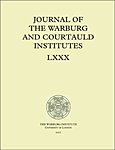
JOURNAL OF THE WARBURG AND COURTAULD INSTITUTES
Bridging Visual Arts and Intellectual InquiryWelcome to the JOURNAL OF THE WARBURG AND COURTAULD INSTITUTES, a distinguished scholarly publication dedicated to the study of art history, cultural studies, and the interconnections between visual arts and intellectual history. Established in 1964 and published by the Warburg Institute, this journal serves as a vital platform for innovative research and interdisciplinary scholarship. Although it currently holds a Q4 ranking in both Arts and Humanities (Miscellaneous) and Cultural Studies, the journal is committed to fostering critical discourse that transcends conventional boundaries. With an ISSN of 0075-4390 and an E-ISSN of 2044-0014, the journal provides accessible insights for researchers, professionals, and students interested in the evolving landscape of cultural heritage studies. While the journal is not currently open access, its contributions are invaluable for those seeking to deepen their understanding of the intricate relationship between culture and the arts. We invite you to explore the journal's rich archive and engage with the latest academic dialogues shaping the field.
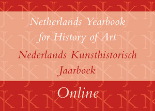
Netherlands Yearbook for History of Art-Nederlands Kunsthistorisch Jaarboek
Unveiling the Intersections of Art and CultureThe Netherlands Yearbook for History of Art-Nederlands Kunsthistorisch Jaarboek, published by BRILL, serves as a critical platform for scholarly discourse in the field of art history, specifically focusing on visual arts and performing arts. With an ISSN of 0169-6726 and an E-ISSN of 2214-5966, this journal fosters a deeper understanding of historical contexts and contemporary issues within the art sector. Although currently categorized in the Q4 quartile of Visual Arts and Performing Arts, it provides valuable insights and promotes interdisciplinary studies that enrich the academic narrative surrounding art history. Researchers, professionals, and students alike will find this journal instrumental in accessing rigorous peer-reviewed articles, case studies, and critical essays that span converged years from 2002 to 2003, 2005 to 2006, 2008 to 2011, 2013 to 2017, and 2019 to 2022. As the realm of art history continues to evolve, this publication remains a vital resource for exploring the cultural significance and historical legacy of artistic practice.
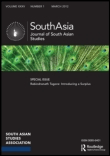
SOUTH ASIA-JOURNAL OF SOUTH ASIAN STUDIES
Exploring the Rich Tapestry of South Asian NarrativesSOUTH ASIA-JOURNAL OF SOUTH ASIAN STUDIES, published by Routledge Journals, Taylor & Francis Ltd, stands as a seminal platform for scholarly discourse in South Asian studies. With a proud history dating back to 1971, the journal provides a comprehensive examination of the region's multifaceted cultural, historical, and socio-political dynamics. Renowned for its rigorous peer-reviewed articles, it is listed in the prestigious Q1 category in Cultural Studies and History and has garnered respect across the social sciences, indicated by its competitive rankings in Development and Sociology and Political Science. Although it does not currently offer open access, the journal's influence is evident, boasting an impressive impact in its fields as indicated by its Scopus rankings, with a noteworthy 88th percentile in History. Targeted towards researchers, professionals, and students alike, SOUTH ASIA-JOURNAL OF SOUTH ASIAN STUDIES is essential for anyone seeking to deepen their understanding of South Asian complexities and contribute to ongoing academic conversations.

HISTORY AND PHILOSOPHY OF THE LIFE SCIENCES
Unraveling the Threads of Life Sciences Through Time and ThoughtHISTORY AND PHILOSOPHY OF THE LIFE SCIENCES, published by SPRINGER INT PUBL AG, stands as a leading peer-reviewed journal dedicated to exploring the intricate relationships between historical narratives and philosophical frameworks in the life sciences. With its robust impact factor and recognized position as a Q1 journal in key categories such as Arts and Humanities, History, and History and Philosophy of Science, this journal provides a vital platform for researchers, professionals, and students seeking to delve into the theoretical underpinnings and historical trajectories shaping contemporary life sciences. Established in 1979 and evolving through its converged years until 2024, it reflects the journal's enduring commitment to advancing scholarly discourse in its field. While the journal is not open access, it nonetheless attracts a diverse readership, facilitating meaningful research exchanges and interdisciplinary dialogues. Located in the picturesque country of Switzerland, the journal invites contributions that foster critical examination and innovative thinking in the historiography and philosophy of life sciences, ultimately enhancing our understanding of this dynamic and significant discipline.
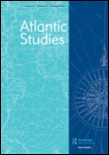
Atlantic Studies-Global Currents
Navigating the Intersections of History and LiteratureAtlantic Studies: Global Currents is an esteemed journal published by Routledge Journals, Taylor & Francis Ltd, dedicated to the interdisciplinary exploration of the Atlantic region's cultural, historical, and literary narratives. Since its inception in 2010, the journal has established itself as a vital platform for scholars seeking to engage with the complexities of Atlantic Studies, offering a valuable resource that fosters innovative discourse and critical analysis. With its 2023 rankings placing it in the Q1 category in History and Literature, as well as Q2 in Cultural Studies, it is recognized for its substantial contribution to these fields. The journal is highly regarded, boasting impressive Scopus ranks, including a rank of #152 out of 1106 for Literature and Literary Theory, reflecting its significant influence and impact within the academic community. Researchers and students alike will find Atlantic Studies: Global Currents an essential journal that not only disseminates cutting-edge research but also expands the understanding of global currents shaping the Atlantic world today.
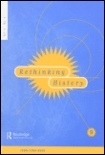
RETHINKING HISTORY
Innovating Historical Scholarship for TomorrowRETHINKING HISTORY is a prestigious academic journal published by Routledge Journals, Taylor & Francis Ltd from the United Kingdom. With an ISSN of 1364-2529 and an E-ISSN of 1470-1154, this journal serves as a vital platform for critical discourse and innovative scholarship in the field of history. Since its inception in 1997, RETHINKING HISTORY has continuously strived to push the boundaries of historical study, providing a forum for interdisciplinary research and theoretical exploration. It holds an impressive Q1 ranking in History, reflecting its high impact and influence, with a Scopus rank of #203 out of 1760, placing it in the 88th percentile among history journals. The journal publishes original articles, reviews, and theoretical pieces that challenge conventional narratives and encourage new perspectives on historical events and methodologies. Although it is not currently an Open Access journal, RETHINKING HISTORY plays an essential role in shaping contemporary historical research and thought, appealing to a diverse audience of researchers, professionals, and students committed to the exploration of history’s complexities.